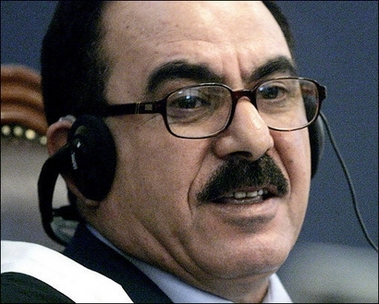BAGHDAD, Iraq - The chief
judge in Saddam Hussein's genocide trial was replaced Tuesday amid complaints
from Shiite and Kurdish officials that he was too easy on the deposed Iraqi
leader.
It was the second time that a chief judge was changed while Saddam was on
trial; in each case there were accusations that Saddam was allowed too much
leeway in court.

Chief judge Abdullah
al-Ameri argues with a prosecutor during the trial of former Iraqi
president Saddam Hussein at the fortified Green Zone in Baghdad. Iraq
sacked the controversial chief judge in the genocide trial of Saddam
Hussein, dealing another blow to the legal proceedings against the ousted
president. [AFP] |
Abdullah al-Amiri was replaced on the five-member panel by his deputy in the
trial, Mohammed al-Uraibiy, a court official said. The new chief judge is a
Shiite Arab, as is al-Amiri.
The Iraqi High Tribunal, the country's supreme court, sought the change and
Prime Minister Nouri al-Maliki approved it, a government official said. Both
officials asked not to be named because they are not authorized to speak to the
media.
An attorney defending senior officials in Saddam's former regime decried the
change as purely political.
"This was a coup that succeeded. There was no legal reason for removing him
(al-Amiri)," defense lawyer Badee Izzat Aref told The Associated Press. "They
(court officials) felt that he would not respond to their demands."
Hussein al-Duri, an aide to al-Maliki, said one reason for the change was
al-Amiri's statement in court last week, in which he told Saddam, "You were not
a dictator."
In Iraq, al-Duri told Al-Arabiya television, "it is not allowed for the judge
to express his opinion."
Al-Amiri's comment angered many Kurds and Shiites and fueled criticism that
he was too lenient with Saddam. Prosecutors had earlier asked for al-Amiri to be
replaced after he allowed Saddam to lash out at Kurdish witnesses in court.
The change could revive complaints that the government is interferring with
the trial in the hope that Saddam and his co-defendants will be convicted
quickly. Saddam faces a possible death penalty if convicted on genocide charges
over the Anfal military offensive against Iraqi Kurds in the 1980s.
In Saddam's first trial - over alleged atrocities against Shiites in the town
of Dujail - the chief judge stepped down halfway through the proceedings, saying
he could no longer put up with criticism from officials who said he allowed too
many courtroom outbursts by Saddam and his co-defendants.
He was followed by a far tougher judge who repeatedly threw defendants and
defense lawyers out of court.
A verdict in the Dujail trial is expected Oct. 16.
Al-Amiri presided over the latest session of the current trial Tuesday, in
which Kurdish survivors of Anfal recounted the bombardment of their villages by
the Iraqi military.
One witness, Iskandar Mahmoud Abdul-Rahman, a major in the Kurdish security
force, testified that an attack on his village began on March 20, 1988, when
Iraqi aircraft appeared in the sky.
"We dropped to the floor; white smoke covered us, it smelled awful,"
Abdul-Rahman said. "My heart raced. I started to vomit. I felt dizzy. My eyes
burned and I couldn't stand on my feet."
He said he was treated at two hospitals in Iran, and lost consciousness for
10 days.
"The doctors were frequently giving me injections and medication, including
eye drops. They cut the burned skin with scissors," he said, adding that his
eyesight remains poor.
Abdul-Rahman then removed his blue shirt. There were several dark scars, each
about 8 inches long, on his back.
Saddam's chief lawyer, Khalil al-Dulaimi, and prosecutor Munqith al-Faroon
approached the witness to take a close look.
Saddam and six other defendants are on trial for alleged atrocities against
Kurds during Operation Anfal, a crackdown on Kurdish guerrillas in the late
1980s. The prosecution alleges some 180,000 people died in the campaign, many of
them civilians killed by poison gas.
Saddam and his cousin "Chemical" Ali al-Majid are charged with genocide, and
the others are accused of various offenses. All could face death by hanging if
convicted.
Two other witnesses also testified Tuesday, repeating allegations of abuse in
the crackdown.
Raouf Faraj Abdullah, a 55-year-old farmer, told of poor living conditions
and a shortage of food in a detention camp in the northern city of Irbil.
"The people of Irbil tossed food over the barbed wire," said Abdullah.
He said he was moved to another camp, where he was separated from his
2-year-old son and his wife, who later gave birth in her prison cell.
"When I went to see her, I found out that my newborn baby had died," he said.
Abdullah said 28 people were killed in attacks on his village.
A third witness, Ubeyd Mahmoud Mohammed, said 70 people, including his wife
and six children, were killed by an attack on his village March 22, 1988.
Saddam sat silently throughout the testimony, taking notes.
However, the session was marked by a heated exchange between the senior
prosecutor, Jaafar al-Moussawi, and defense lawyer Aref, who accused prosecutors
of misleading the court by presenting a witness who allegedly had a forged
passport.
He referred to an Iraqi Kurd who testified Monday that he sought asylum in
the Netherlands, where he acquired Dutch citizenship in 1994.
Saddam and his lawyers argued Iraqi law barred dual nationality, and asked
that the man's testimony be stricken from the record.